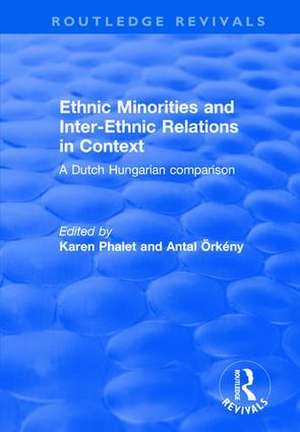Ethnic Minorities and Inter-ethnic Relations in Context: A Dutch-Hungarian Comparison: Routledge Revivals
Editat de Karen Phalet, Antal Orkenyen Limba Engleză Paperback – 21 iun 2019
| Toate formatele și edițiile | Preț | Express |
|---|---|---|
| Paperback (1) | 241.15 lei 6-8 săpt. | |
| Taylor & Francis – 21 iun 2019 | 241.15 lei 6-8 săpt. | |
| Hardback (1) | 689.30 lei 6-8 săpt. | |
| Taylor & Francis – 14 sep 2017 | 689.30 lei 6-8 săpt. |
Din seria Routledge Revivals
- 9%
 Preț: 767.40 lei
Preț: 767.40 lei - 9%
 Preț: 1004.17 lei
Preț: 1004.17 lei - 9%
 Preț: 934.94 lei
Preț: 934.94 lei -
 Preț: 230.80 lei
Preț: 230.80 lei -
 Preț: 294.72 lei
Preț: 294.72 lei -
 Preț: 258.66 lei
Preț: 258.66 lei - 9%
 Preț: 903.41 lei
Preț: 903.41 lei - 18%
 Preț: 695.85 lei
Preț: 695.85 lei -
 Preț: 296.10 lei
Preț: 296.10 lei -
 Preț: 342.36 lei
Preț: 342.36 lei - 9%
 Preț: 606.35 lei
Preț: 606.35 lei -
 Preț: 309.94 lei
Preț: 309.94 lei - 9%
 Preț: 729.99 lei
Preț: 729.99 lei -
 Preț: 256.94 lei
Preț: 256.94 lei -
 Preț: 230.80 lei
Preț: 230.80 lei -
 Preț: 259.47 lei
Preț: 259.47 lei - 9%
 Preț: 903.80 lei
Preț: 903.80 lei -
 Preț: 153.81 lei
Preț: 153.81 lei -
 Preț: 258.66 lei
Preț: 258.66 lei -
 Preț: 294.91 lei
Preț: 294.91 lei -
 Preț: 200.66 lei
Preț: 200.66 lei -
 Preț: 199.85 lei
Preț: 199.85 lei -
 Preț: 308.89 lei
Preț: 308.89 lei -
 Preț: 295.04 lei
Preț: 295.04 lei -
 Preț: 382.23 lei
Preț: 382.23 lei -
 Preț: 258.66 lei
Preț: 258.66 lei -
 Preț: 343.21 lei
Preț: 343.21 lei - 9%
 Preț: 640.90 lei
Preț: 640.90 lei - 9%
 Preț: 605.71 lei
Preț: 605.71 lei -
 Preț: 228.88 lei
Preț: 228.88 lei -
 Preț: 257.67 lei
Preț: 257.67 lei -
 Preț: 245.10 lei
Preț: 245.10 lei -
 Preț: 258.52 lei
Preț: 258.52 lei -
 Preț: 258.66 lei
Preț: 258.66 lei -
 Preț: 368.93 lei
Preț: 368.93 lei -
 Preț: 246.37 lei
Preț: 246.37 lei - 9%
 Preț: 764.34 lei
Preț: 764.34 lei -
 Preț: 258.66 lei
Preț: 258.66 lei -
 Preț: 326.26 lei
Preț: 326.26 lei -
 Preț: 286.98 lei
Preț: 286.98 lei - 8%
 Preț: 418.23 lei
Preț: 418.23 lei - 5%
 Preț: 231.22 lei
Preț: 231.22 lei -
 Preț: 267.15 lei
Preț: 267.15 lei -
 Preț: 295.62 lei
Preț: 295.62 lei - 9%
 Preț: 638.61 lei
Preț: 638.61 lei -
 Preț: 260.85 lei
Preț: 260.85 lei -
 Preț: 339.90 lei
Preț: 339.90 lei -
 Preț: 381.17 lei
Preț: 381.17 lei -
 Preț: 294.53 lei
Preț: 294.53 lei -
 Preț: 294.72 lei
Preț: 294.72 lei
Preț: 241.15 lei
Preț vechi: 288.80 lei
-16% Nou
Puncte Express: 362
Preț estimativ în valută:
46.15€ • 47.68$ • 38.41£
46.15€ • 47.68$ • 38.41£
Carte tipărită la comandă
Livrare economică 25 martie-08 aprilie
Preluare comenzi: 021 569.72.76
Specificații
ISBN-13: 9780415793032
ISBN-10: 0415793033
Pagini: 414
Dimensiuni: 152 x 219 mm
Greutate: 0.45 kg
Ediția:1
Editura: Taylor & Francis
Colecția Routledge
Seria Routledge Revivals
Locul publicării:Oxford, United Kingdom
ISBN-10: 0415793033
Pagini: 414
Dimensiuni: 152 x 219 mm
Greutate: 0.45 kg
Ediția:1
Editura: Taylor & Francis
Colecția Routledge
Seria Routledge Revivals
Locul publicării:Oxford, United Kingdom
Cuprins
1: Ethnic Minorities and Inter-Ethnic Relations: National Configurations and Cross-National Dimensions 1; I: Ethnic and National Identities and Stereotypes; 2: Stereotypes of Ethnic Minorities in the Netherlands; 3: Recent Dutch Research on Ethnocentrism in an International Perspective; 4: Determinants of Denial and Acceptance of Refugees in Hungary; 5: Ethnic Minority Identification; 6: Nationalism, its Conceptualisation and Operationalisation; 7: Representations of Minorities among Hungarian Children; II: Antisemitism and Anti-‘Gypsy’ Prejudice; 8: The Strength of Antisemitism in Present-Day Hungary; 9: Research on Antisemitism: a Review of Previous Findings and the Case of the Netherlands in the 1990s; 10: Authoritarianism and Prejudice in Present-Day Hungary; 11: Attitudes and Stereotypes of Hungarian Police toward Gypsies 1; III: Spheres of Exclusion; 12: Ethnic Minority Educational and Labour Market Performance in the Netherlands; 13: Roma Students in the Hungarian Educational System; 14: Socio-Economic and Ethnic Residential Segregation in Budapest during Market Transition; 15: Immigration and Ethnic Segregation in the Netherlands with a Special Focus on Amsterdam; IV: Towards a Politics of Inclusion?; 16: Verzuiling and Post-Verzuiling Politics in the Netherlands: Coping with Changing Diversity; 17: Towards a Model of Incorporation: the Case of the Netherlands; 18: Legal Protection of Minority Rights in Hungary; 19: Too Close for Comfort: How Immigration Unsettles Political Theory and Practice
Descriere
This volume is based on papers presented on ethnic minorities and inter-ethnic relations in Hungary and The Netherlands, which were presented and discussed in three conferences and a series of meetings from 1997-1999. This work builds on comparative studies of the rise of a radical right and the mobilization of anti-immigrant feelings. It presents cross-national comparative research, due to the creedence that shifting national angles is a powerful strategic tool with which to correct national bias and to uncover submerged or overlooked aspects of specific national cases.
